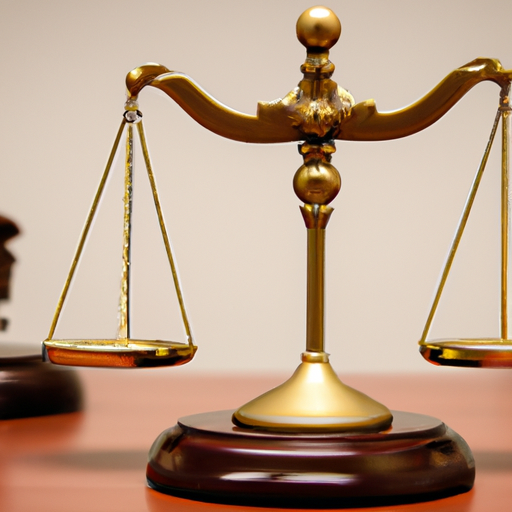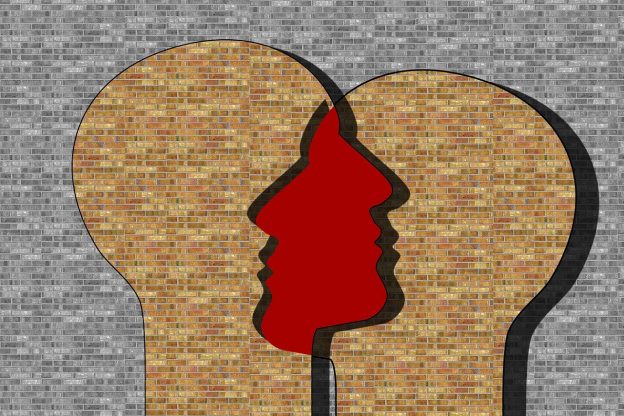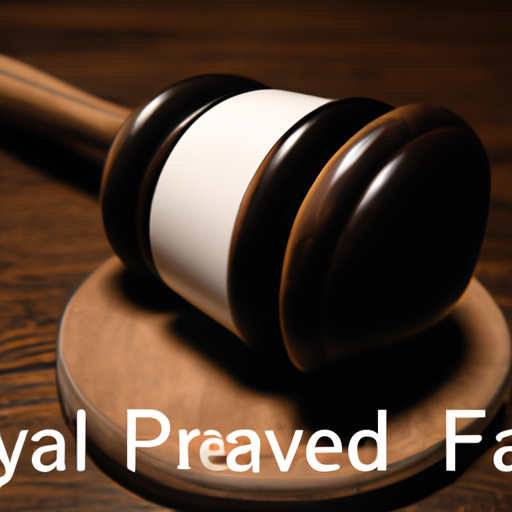In the realm of criminal law, navigating the intricate web of ethical considerations is paramount. As a business owner or executive, your organization’s reputation and financial stability depends on adhering to the highest ethical standards, even in the face of criminal allegations. Recognizing the complexities involved in criminal ethics, it is crucial to seek guidance from a seasoned lawyer who can provide clarity and strategic counsel tailored to your specific needs. With a deep understanding of the legal landscape, this lawyer can ensure your interests are protected while safeguarding your organization’s integrity. Don’t hesitate to reach out for a consultation to discuss your situation and explore effective solutions.
Definition of Criminal Ethics
Criminal ethics refers to the principles and guidelines that govern the behavior and conduct of criminal defense attorneys. These ethical standards help ensure that attorneys uphold the values of justice, fairness, and integrity while representing clients who are facing criminal charges. Ethical conduct is essential in the legal profession as it establishes trust between attorneys and their clients and ensures that the criminal justice system operates with the highest level of professionalism and adherence to the rule of law.
Importance of Ethical Conduct in Criminal Defense
Maintaining Client Confidentiality
One of the fundamental ethical obligations of a criminal defense attorney is to maintain client confidentiality. This duty is essential in establishing trust and facilitating open communication between the attorney and the client. By maintaining strict confidentiality, attorneys can create a safe space for clients to share crucial and often sensitive information about their case. By protecting this information, attorneys uphold the attorney-client privilege, which is crucial in building an effective defense strategy.
Avoiding Conflicts of Interest
Ethical conduct requires criminal defense attorneys to avoid conflicts of interest. This means that attorneys must not represent clients if there is a possibility that their personal interests or relationships could compromise their ability to provide unbiased and diligent representation. Conflicts of interest can undermine the attorney’s duty to act in the best interests of the client and may impede the attorney’s ability to provide effective representation.
Respecting the Attorney-Client Privilege
The attorney-client privilege is a cornerstone of the legal profession and plays a vital role in maintaining a client’s trust in their attorney. Criminal defense attorneys have an ethical obligation to respect this privilege. This means that attorneys must not disclose any information that their client has shared in confidence, even after the attorney-client relationship has ended. Respecting the attorney-client privilege helps ensure that clients can fully disclose the details of their case without fear of their words being used against them.
Maintaining Professionalism and Integrity
Professionalism and integrity are key ethical principles that criminal defense attorneys must adhere to. Professionalism entails conducting oneself in a manner that upholds the dignity and reputation of the legal profession. This includes respecting the court, maintaining punctuality, and adhering to ethical guidelines. Integrity requires attorneys to be honest, trustworthy, and transparent in their interactions with clients, opposing counsel, prosecutors, judges, and other parties involved in the criminal justice system.
Ethical Dilemmas in Criminal Defense
Zealous Advocacy vs. Fairness
An ongoing ethical dilemma for criminal defense attorneys is balancing zealous advocacy for their clients with a commitment to fairness and justice. While attorneys have a duty to vigorously defend their clients’ interests, it is essential to refrain from engaging in unethical tactics that may undermine the integrity of the legal process. Striking the right balance between zealous advocacy and fairness requires careful consideration of ethical obligations and the overarching goal of upholding justice.
Defending Guilty Clients
Defending clients who may be guilty of the crimes they are charged with presents a significant ethical challenge for criminal defense attorneys. While everyone has the right to legal representation and a fair trial, attorneys must grapple with the moral implications of advocating for clients whose actions may have caused harm. Ethical misconduct arises when defense attorneys knowingly present false evidence or make false statements in an attempt to secure an acquittal. Balancing the duty to the client with the responsibility to the court and the justice system requires ethical decision-making.
Disclosure of Evidence
Ethics come into play when it comes to the disclosure of evidence. Criminal defense attorneys have an ethical obligation to disclose all relevant evidence to the prosecution, even if it may be damaging to their client’s case. This duty stems from the principle of fairness and the pursuit of justice. Failure to disclose exculpatory evidence can not only lead to legal consequences for the attorney but can also result in wrongful convictions and a breach of the attorney’s ethical obligations.
Lawyer as a Witness
Another ethical dilemma arises when an attorney becomes a witness in their client’s case. Generally, attorneys should avoid becoming witnesses in the cases they are handling. However, in certain situations, the attorney’s testimony may be crucial for the client’s defense. When faced with this dilemma, attorneys must carefully consider potential conflicts of interest, weigh the impact on their ability to advocate effectively, and ensure they comply with the ethical rules governing such situations.
Legal Ethics Codes for Criminal Defense Attorneys
Model Rules of Professional Conduct
The Model Rules of Professional Conduct, developed by the American Bar Association (ABA), serve as the standard of ethical conduct for attorneys in the United States. Criminal defense attorneys are bound by these rules, which outline their duties and responsibilities to their clients, the court, and the legal profession as a whole. The Model Rules cover a wide range of ethical issues, including conflicts of interest, diligence, communication, and the duty of confidentiality.
ABA Standards for Criminal Justice
The ABA Standards for Criminal Justice provide guidance specifically for criminal defense attorneys and cover various aspects of ethical conduct in the criminal justice system. These standards address issues such as pretrial and trial conduct, the attorney-client relationship, advocacy, and the attorney’s responsibilities to society and the legal profession. Criminal defense attorneys can rely on these standards to inform their ethical decision-making and ensure the highest level of professional conduct.
State and Local Ethical Rules
In addition to the Model Rules and ABA Standards, criminal defense attorneys must also adhere to state and local ethical rules. Each jurisdiction may have its own specific rules that attorneys must follow, and failure to do so can result in disciplinary action. It is essential for attorneys to familiarize themselves with the ethical rules in their jurisdiction to ensure compliance and maintain the highest standards of professional conduct.
Informed Consent and Decision-Making
Explaining Legal Options and Consequences
Ethical obligations require criminal defense attorneys to provide their clients with the information necessary to make informed decisions about their case. This includes explaining the various legal options available, along with the potential consequences associated with each option. By ensuring that clients understand the potential outcomes and risks, attorneys empower their clients to actively participate in their defense and make informed choices that align with their best interests.
Considering Client’s Best Interests
Criminal defense attorneys have a duty to act in the best interests of their clients. This duty encompasses more than just legal advice and representation; it also requires attorneys to consider the client’s overall well-being and long-term goals. Attorneys should take into account factors such as the client’s personal circumstances, background, and any potential collateral consequences that may arise from certain legal strategies. By considering the client’s best interests, attorneys can provide holistic and effective representation.
Ensuring Competency and Understanding
Ethical conduct requires criminal defense attorneys to ensure that their clients understand the legal proceedings, their rights, and the potential consequences of their actions. Attorneys must take reasonable steps to communicate effectively with their clients, avoiding specialized legal jargon and providing clear explanations. Moreover, attorneys must continuously educate themselves on changes in the law and remain competent in their areas of practice to provide the highest level of representation.
The Role of Ethics in Plea Bargain Negotiations
Evaluating Prosecution’s Case
Ethical negotiations in plea bargains require criminal defense attorneys to thoroughly evaluate the strengths and weaknesses of the prosecution’s case. Attorneys must diligently review the evidence, assess the credibility of witnesses, and identify potential legal and procedural challenges. By conducting a comprehensive analysis, attorneys can provide informed advice to their clients and negotiate from a position of strength, always with the client’s best interests in mind.
Advising Clients on Plea Deals
Criminal defense attorneys have an ethical duty to provide competent advice regarding plea deals. This includes explaining the potential advantages and disadvantages of accepting a plea bargain, as well as the implications of rejecting such an offer and proceeding to trial. Attorneys should ensure that clients fully understand the consequences of their choices, the potential sentences they may face, and any collateral consequences that may arise from pleading guilty or going to trial.
Negotiating Fair and Ethical Agreements
In plea bargain negotiations, ethical conduct requires criminal defense attorneys to advocate for agreements that are fair and just. Attorneys should pursue outcomes that align with their clients’ best interests while also promoting the principles of fairness and the public’s confidence in the justice system. While it is the attorney’s duty to vigorously represent their client’s interests, it is equally important to ensure that plea agreements do not undermine the integrity of the criminal justice system.
Ethical Challenges in Witness Examination
Cross-Examination Tactics
Effective cross-examination is a crucial skill for criminal defense attorneys, but it can also present ethical challenges. Attorneys must strike a balance between vigorously challenging witnesses’ credibility and avoiding tactics that are dishonest, misleading, or overly aggressive. Ethical cross-examination requires attorneys to respect the dignity and rights of witnesses while still pursuing the truth and uncovering potential inconsistencies or biases.
Dealing with Dishonest Witnesses
Ethics come into play when criminal defense attorneys face dishonest witnesses. Attorneys have a duty to zealously advocate for their clients, but they must not knowingly present false testimony or encourage witnesses to lie. Instead, ethical conduct requires attorneys to challenge the credibility of dishonest witnesses through cross-examination, presenting contradictory evidence, or calling other witnesses who may offer conflicting testimony. By adhering to ethical principles, attorneys can undermine the credibility of dishonest witnesses without compromising their own integrity.
Ensuring Truthful Presentation of Evidence
An ethical obligation of criminal defense attorneys is to ensure the truthful presentation of evidence. Attorneys must not misrepresent facts, suppress or withhold evidence, or present false information to the court. By adhering to ethical standards, attorneys contribute to the fairness and integrity of the legal process while fulfilling their duty to provide diligent and competent representation to their clients.
Representing Vulnerable Populations
Children and Juveniles
When representing children and juveniles in criminal cases, criminal defense attorneys face unique ethical challenges. Attorneys must understand and consider the developmental, emotional, and psychological needs of young clients. They must also take into account the potential long-term consequences of legal action on a child’s future. Advocating for the best interests of children and juveniles requires attorneys to navigate the legal process with sensitivity and compassion while upholding their ethical obligations.
Individuals with Mental Health Issues
Representing individuals with mental health issues presents ethical challenges as attorneys must balance their obligations to provide competent representation with the client’s unique circumstances. Attorneys should consider the client’s mental health needs, ensure effective communication, and potentially collaborate with mental health professionals to devise an appropriate defense strategy. By accommodating the needs of clients with mental health issues, attorneys can uphold ethical standards while providing effective representation.
Immigrants and Non-Native English Speakers
Ethical considerations arise when representing immigrants and non-native English speakers in criminal cases. Attorneys have an obligation to ensure that their clients fully understand the legal proceedings and their rights, regardless of language barriers or cultural differences. This may require arranging for interpretation services, engaging bilingual attorneys, or collaborating with cultural experts to provide effective representation to clients from diverse backgrounds.
Ethical Obligations Towards Prosecutors and Judges
Maintaining Professional Relationships
Criminal defense attorneys have ethical obligations to maintain professional relationships with prosecutors and judges. While attorneys must advocate vigorously for their clients’ interests, it is crucial to do so without engaging in personal attacks or disrespectful conduct. By fostering professional relationships, attorneys can effectively negotiate and navigate the criminal justice system while maintaining the integrity of the legal profession.
Respecting Adversarial System
The adversarial system is the foundation of criminal justice, and criminal defense attorneys have an ethical obligation to respect and uphold this system. Ethical conduct requires attorneys to engage in vigorous advocacy, challenge the prosecution’s case, and protect their clients’ rights. By adhering to ethical principles within the adversarial system, attorneys contribute to the fair and just administration of justice.
Dealing with Unethical Behavior
Ethical challenges arise when attorneys encounter unethical behavior by prosecutors or judges. Criminal defense attorneys have a duty to report such behavior and take appropriate steps to address and rectify the situation. By maintaining the highest ethical standards and holding all parties accountable for their actions, attorneys contribute to the overall integrity of the criminal justice system.
FAQs about Criminal Ethics
What are the consequences of an attorney’s ethical violations?
Attorneys who violate ethical rules may face disciplinary action, which can range from warnings and reprimands to suspension or even disbarment. Additionally, ethical violations can harm an attorney’s professional reputation, negatively impacting their ability to practice law. In serious cases, ethical misconduct can result in criminal charges or civil liability.
Can a criminal defense attorney represent an innocent client?
Yes, criminal defense attorneys have an ethical obligation to provide representation to all clients, regardless of guilt or innocence. Everyone accused of a crime has the right to legal counsel and a fair trial. It is the attorney’s duty to advocate for their client’s rights and present the most robust possible defense, even if the client is ultimately found guilty.
What ethical considerations should a criminal defense attorney keep in mind during trial?
During a trial, criminal defense attorneys must adhere to ethical guidelines related to evidence presentation, witness examination, and professional conduct. Ethical considerations include presenting truthful and accurate evidence, challenging the credibility of witnesses through ethical cross-examination, and avoiding behavior that may undermine the integrity of the legal process.
How does attorney-client privilege work in criminal defense cases?
Attorney-client privilege ensures that communications between a client and their attorney remain confidential. In criminal defense cases, this privilege allows clients to share information about their case without fear of their attorney being compelled to disclose it. The attorney-client privilege continues even after the attorney-client relationship has ended, unless the client provides informed consent for the attorney to disclose information.
What are the penalties for breaching client confidentiality?
Breaching client confidentiality can have severe consequences for an attorney. In addition to potential disciplinary action, attorneys may face legal liability for violating their ethical duty. Moreover, breaching client confidentiality can damage an attorney’s professional reputation, potentially harming their ability to attract clients and maintain a successful legal practice.






















































